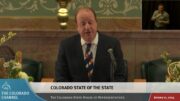By Jeffrey A. Roberts
CFOIC Executive Director
The Colorado Supreme Court this week declined to review issues in a Court of Appeals opinion that could impact the First Amendment rights of lawyers to make statements about public-interest litigation.
“Unfortunate outcome,” said attorney Tom Kelley, a Colorado Freedom of Information Coalition board member and past president who co-authored the petition for certiorari in a case brought against Denver civil rights firm Killmer, Lane & Newman. But, he added, his clients are pleased the court has agreed to consider a privilege that would protect party- and attorney-generated publicity in class action cases.

Last December, the appeals court determined that the law firm can be held liable for certain comments attorney Mari Newman made at a news conference about a federal class-action lawsuit filed on behalf of technicians working for a nail salon. The salon sued Newman for defamation after she alleged the workers had been forced to clean the business “for no pay whatsoever.”
The Supreme Court agreed to look at one public speech issue in the Court of Appeals opinion concerning class-action lawsuits but left in place a ruling “that refuses to recognize any privilege for parties or their counsel (who are in the best position to do so) to accurately announce to the public the allegations of filed litigation,” Kelley told CFOIC.
“This, at a time when the media lacks the capacity to cover most civil litigation,” he added. “Publicity concerning civil litigation aids the process by causing witnesses to come forward and keeping the system and its participants honest and accountable.”
In a motion filed with other groups in February, CFOIC said it believes the appellate ruling “chills litigation attorneys from discussing their cases with members of the press, for fear that doing so will create financial exposure.” That, in turn, “dramatically limits” the rights of Coloradans “to receive informed and accurate information about legal claims being adjudicated in the courts.”
The Court of Appeals found that some of Newman’s statements made during a press conference were opinions protected by the First Amendment. Other statements, the appellate court ruled, were not protected by the litigation privilege, which shields a lawyer who publishes alleged “defamatory matter” about another person or party in relation to a judicial proceeding.
“The privilege has limits,” a three-judge panel of the Court of Appeals wrote. The privilege did not apply in the nail salon case, the judges said, because the attorneys had a “feasible way” of finding nail technicians who had an interest in participating in the class-action lawsuit. “But they nevertheless broadly published the alleged defamatory communications to those having no interest in the case.”
The certiorari petition co-authored by Kelley warned that the Court of Appeals ruling threatens the “pipeline of information with the lack of clarity about what speech is protected.”
“This is especially dangerous now, when news media often lack resources to discover and report on much important civil litigation. The right to bring that information to the attention of the media and the public is not only integral to, but is an essential component of, the right to seek justice from the courts.”
Follow the Colorado Freedom of Information Coalition on Twitter @CoFOIC. Like CFOIC’s Facebook page. Do you appreciate the information and resources provided by CFOIC? Please consider making a tax-deductible donation.




